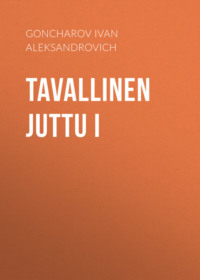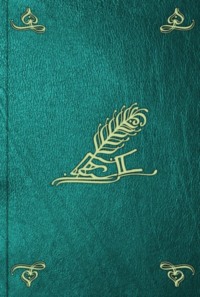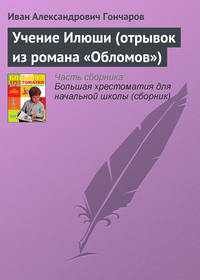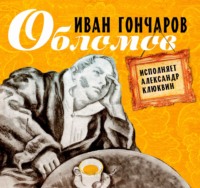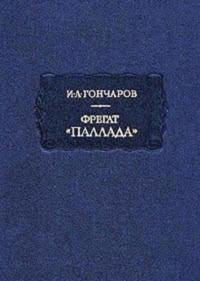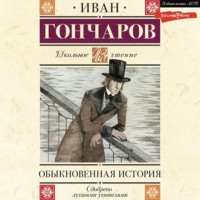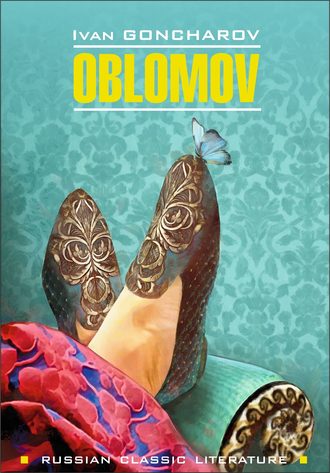
Полная версия
Oblomov / Обломов. Книга для чтения на английском языке
These lucky people imagined that everything was as it should be and were convinced that everyone else lived like them and to live otherwise was a sin. They would not believe it if someone told them that there were people who had other ways of ploughing, sowing, harvesting, and selling. What passions and excitements could they possibly have? Like everyone else, they had their worries and weaknesses, rent and taxes, idleness and sleep; but all this did not amount to a great deal and did not stir their blood. For the last five years not one of the several hundred peasants of that locality had died a natural, let alone a violent, death. And when someone had gone to his eternal sleep either from old age or from some chronic illness, the people there had gone on marvelling at such an extraordinary event for months. And yet it did not surprise them at all that, for instance, Taras the blacksmith had nearly steamed himself to death in his mud hut so that he had to be revived with cold water. The only crime that was greatly prevalent was the theft of peas, carrots, and turnips from the kitchen gardens, and on one occasion two sucking pigs and a chicken had suddenly disappeared – an event which outraged the whole neighbourhood and was unanimously attributed to the fact that carts with wooden wares had passed through the village on their way to the fair. But, generally speaking, accidents of any kind were extremely rare.
Once, however, a man had been found lying in a ditch by the bridge outside a village, evidently a member of a co-operative group of workmen who had passed by on their way to the town. The boys were the first to discover him, and they ran back terrified to the village with the news that some terrible serpent or werewolf was lying in a ditch, adding that he had chased them and nearly eaten Kuzka. The braver souls among the peasants armed themselves with pitchforks and axes and went in a crowd to the ditch.
«Where are you off to?» The old men tried to stop them. «Think yourselves stout fellows, do you? What do you want there? Leave it alone, no one’s driving you».
But the peasants went, and about a hundred yards from the spot began calling to the monster in different voices, and as there was no reply, they stopped, then moved on again. A peasant lay in the ditch, leaning his head against its side; a bundle and a stick with two pairs of bast-shoes tied on it, lay beside him. They did not venture near him or touch him.
«Hey you, there!» they shouted in turn, scratching their heads or their backs. «What’s your name? Hey, you! What do you want here?»
The stranger tried to raise his head but could not; evidently he was either ill or very tired. One peasant nearly brought himself to touch him with his pitchfork.
«Don’t touch him! Don’t touch him!» many of the others cried. «How do we know what sort of a man he is? He hasn’t said a word. He may be one of them – don’t touch him, lads!»
«Let’s go», some said. «Come on now: he isn’t one of ours, is he? He’ll only bring us trouble!»
And they all went back to the village, telling the old men that a stranger was lying there who would not speak and goodness only knows what he was up to.
«Don’t have anything to do with him if he is a stranger», the old men said, sitting on the mound of earth beside their cottages, with their elbows on their knees. «Let him do as he likes! You shouldn’t have gone at all!»
Such was the spot where Oblomov suddenly found himself in his dream. Of the three or four villages scattered there, one was Sosnovka and another Vavilovka, about a mile from each other. Sosnovka and Vavilovka were the hereditary property of the Oblomov family and were therefore known under the general name of Oblomovka. The Oblomov country seat was in Sosnovka. About three and a half miles from Sosnovka lay the little village of Verkhlyovo, which had once belonged to the Oblomov family but which had long since passed into other hands, and a few more scattered cottages which went with it. This village belonged to a rich landowner who was never to be seen on his estate, which was managed by a German steward.
Such was the whole geography of the place.
Oblomov woke up in the morning in his small bed. He was only seven. He felt light-hearted and gay. What a pretty, red-cheeked, and plump boy he was! He had such sweet, round cheeks that were the envy of many a little rogue who would blow up his own on purpose, but could never get cheeks like that. His nurse was waiting for him to wake up. She began putting on his stockings, but he did not let her; he played about, dangling his legs. His nurse caught him, and they both laughed. At last she succeeded in making him get up. She washed his face, combed his hair, and took him to his mother. Seeing his mother, who had been dead for years, Oblomov even in his sleep thrilled with joy and his ardent love for her; two warm tears slowly appeared from under his eyelashes and remained motionless. His mother covered him with passionate kisses, then looked at him anxiously to see if his eyes were clear, if anything hurt him, asked the nurse if he had slept well, if he had waked in the night, if he had tossed in his sleep, if he had a temperature. Then she took him by the hand and led him to the ikon. Kneeling down and putting her arm round him, she made him repeat the words of a prayer. The boy repeated them after her absent-mindedly, gazing at the window, through which the cool of the morning and the scent of lilac poured into the room.
«Are we going for a walk to-day, Mummy?» he suddenly asked in the middle of the prayer.
«Yes, darling», she replied hurriedly, without taking her eyes off the ikon and hastening to finish the holy words.
The boy repeated them listlessly, but his mother put her whole soul into them. Then they went to see his father, and then they had breakfast.
At the breakfast table Oblomov saw their aunt, an old lady of eighty; she was constantly grumbling at her maid, who stood behind her chair waiting on her and whose head shook with age. Three elderly spinsters, his father’s distant relations, were also there, as well as his father’s slightly mad brother, and a poor landowner by the name of Chekmenev, the owner of seven serfs, who was staying with them, and several old ladies and old gentlemen. All these members of the Oblomov retinue and establishment picked up the little boy and began showering caresses and praises on him; he had hardly time to wipe away the traces of the unbidden kisses. After that they began stuffing him with rolls, biscuits, and cream. Then his mother hugged and kissed him again and sent him for a walk in the garden, the yard, and the meadow, with strict instructions to his nurse not to leave the child alone, not to let him go near the horses, the dogs, and the goat or wander too far from the house, and, above all, not to let him go to the ravine, which had a bad name as the most terrible place in the neighbourhood. Once they found a dog there which was reputed to be mad only because it ran away and disappeared behind the hills when attacked with pitchforks and axes; carcasses were thrown into the ravine, and wolves and robbers and other creatures which did not exist in those parts or anywhere else in the world were supposed to live there.
The child did not wait for his mother to finish her warnings; he was already out in the yard. He examined his father’s house and ran round it with joyful surprise, as though he had never seen it before: the gates which leaned to one side; the wooden roof which had settled in the middle and was overgrown with tender green moss; the rickety front steps; the various outbuildings and additions built on to it, and the neglected garden. He was dying to climb on to the projecting gallery which went all round the house and to have a look at the stream from there; but the gallery was very old and unsafe, and only the servants were allowed to go there – nobody else used it. He didn’t heed his mother’s prohibition and was already running to the inviting steps when his nurse appeared and succeeded in catching him. He rushed away from her to the hay-loft, intending to climb up the steep ladder leading to it, and she had no sooner reached the hay-loft than she had to stop him climbing up the dovecote, getting into the cattle yard and – Lord forbid – the ravine.
«Dear me, what an awful child – what a fidget, to be sure!» his nurse said. «Can’t you sit still for a minute, sir? Fie, for shame!»
The nurse’s days – and nights – were one continuous scurrying and dashing about: one moment in agony, another full of joy, afraid that he might fall and hurt himself, deeply moved by his unfeigned childish affection, or vaguely apprehensive about his distant future – this was all she lived for, these agitations warmed the old woman’s blood and sustained her sluggish existence which might otherwise have come to an end long before.
The child, however, was not always so playful; sometimes he suddenly grew quiet and gazed intently at everything as he sat beside his nurse. His childish mind was observing closely all that was going on around him; these impressions sank deeply into his soul, and grew and matured with him.
It was a glorious morning; the air was cool; the sun was still low. Long shadows fell from the house, the trees, the dovecote, and the gallery. The garden and the yard were full of cool places, inviting sleep and day-dreaming. Only the rye-fields in the distance blazed and shimmered, and the stream sparkled and glittered in the sun so that it hurt one’s eyes to look at it.
«Why, Nanny, is it so dark here and so light there, and why will it be light here soon as well?»
«Because the sun is going to meet the moon, my dear, and frowns when it can’t find it, but as soon as it sees it in the distance it grows brighter».
The little boy grew thoughtful and went on looking all about him: he saw Antip going to get water and another Antip, ten tunes bigger than the real one, walking beside him along the ground, and the water-barrel looked as big as a house, and the horse’s shadow covered the whole of the meadow, and after taking only two steps across the meadow, it suddenly moved across the hill, and Antip had had no time to leave the yard. The child, too, took two steps – another step and he would be on the other side of the hill. He would like to have gone there to see where the horse had disappeared to. He ran to the gate, but his mother’s voice could be heard from the window:
«Nurse, don’t you see that the child has run out in the sun! Take him where it’s cool. If his head gets hot, he’ll be sick and lose his appetite. If you’re not careful, he’ll run to the ravine».
«Oh, you naughty boy!» the nurse grumbled softly as she took him back to the house.
The boy watched with his keen and sensitive eyes what the grown-ups were doing and how they were spending the morning. Not a single detail, however trifling, escaped the child’s inquisitive attention; the picture of his home-life was indelibly engraved on his memory; his malleable mind absorbed the living examples before him and unconsciously drew up the programme of his life in accordance with the life around him.
The morning could not be said to be wasted in the Oblomov house. The clatter of knives chopping meat and vegetables in the kitchen could be heard as far as the village. From the servants’ hall came the hum of the spindle and the soft, thin voice of a woman: it was difficult to say whether she was crying or improvising a melancholy song without words. As soon as Antip returned to the yard with the barrel of water, the women and the coachmen came trudging towards it from every direction with pails, troughs, and jugs. Then an old woman carried a basinful of flour and a large number of eggs from the storehouse to the kitchen; the cook suddenly threw some water out through the window and splashed Arapka, which sat all morning with its eyes fixed on the window, wagging its tail and licking its chops.
Oblomov’s father was not idle, either. He sat at the window all morning, keeping a wary eye on all that was going on in the yard.
«Hey, Ignashka, what are you carrying there, you fool?» he would ask a servant walking across the yard.
«I’m taking the knives to be sharpened, sir», the man would answer, without looking at his master.
«Very well, and mind you sharpen them properly».
Then he would stop a peasant woman.
«Hey, my good woman, where have you been?»
«To the cellar, sir», she would stop and reply, shielding her eyes and gazing at the window. «Been to fetch some milk for dinner».
«All right, go, go», her master would reply. «And mind you don’t spill the milk. And you, Zakharka, where are you off to again, you rogue?» he shouted later. «I’ll show you how to run! It’s the third time I’ve seen you. Back to the hall with you!»
And Zakharka went back to the hall to doze.
If the cows came back from the fields, Oblomov’s father would be the first to see that they were watered; if he saw from the window that the dog was chasing a hen, he would at once take stern measures to restore order.
His wife, too, was very busy: she spent three hours explaining to Averka, the tailor, how to make a tunic for Oblomov out of her husband’s jacket, drawing the pattern in chalk and watching that Averka did not steal any cloth; then she went to the maids’ room to tell each girl what her daily task of lace-making was; then she called Nastasya Ivanovna, or Stepanida Agapovna, or someone else from her retinue for a walk in the garden with the practical purpose of seeing how ripe the apples were, if the one that was ripe the day before had fallen off the tree, to do some grafting or pruning, and so on. Her chief concern, however, was the kitchen and the dinner. The whole household was consulted about the dinner: the aged aunt, too, was invited to the council. Everyone suggested a dish: giblet soup, noodles, brawn, tripe, red or white sauce. Every advice was taken into consideration, thoroughly discussed, and then accepted or rejected in accordance with the final decision of the mistress of the house. Nastasya Petrovna or Stepanida Ivanovna was constantly being sent to the kitchen to remind the cook of something or other, to add one dish or cancel another, to take sugar, honey, wine for the cooking, and see whether the cook had used all that he had been given.
Food was the first and foremost concern at Oblomovka. What calves were fattened there every year for the festival days! What birds were reared there! What deep understanding, what hard work, what care were needed in looking after them! Turkeys and chickens for name-days and other solemn occasions were fattened on nuts. Geese were deprived of exercise and hung up motionless in a sack a few days before a festival so that they should get covered with fat. What stores of jams, pickles, and biscuits! What meads, what kvases, were brewed, what pies baked at Oblomovka!
And so up to midday everyone was busy, everyone was living a full, conspicuous, ant-like life. These industrious ants were not idle on Sundays and holidays, either: on those days the clatter of knives in the kitchen was louder than ever; the kitchen-maid journeyed a few times from the barn to the kitchen with a double quantity of flour and eggs; in the poultry yard there was a greater uproar and more bloodshed than ever. An enormous pie was baked, which was served cold for dinner on the following day; on the third and fourth day its remnants were sent to the maids’ room, where it lasted till Friday, when one stale end of it without stuffing descended by special favour to Antip, who, crossing himself, proudly and fearlessly demolished this interesting fossil, enjoying the consciousness that it was his master’s pie more than the pie itself, like an archaeologist who will enjoy drinking some wretched wine out of what remains of some vessel a thousand years old.
The child kept observing and watching it all with his childish mind, which did not miss anything. He saw how often a usefully and busily spent morning was followed by midday and dinner.
At midday it was hot; not a cloud in the sky. The sun stood motionless overhead scorching the grass. There was not the faintest breeze in the motionless air. Neither tree nor water stirred; an imperturbable stillness fell over the village and the fields, as though everything were dead. The human voice sounded loud and clear in the empty air. The flight and the buzzing of a beetle could be heard a hundred yards away, and from the thick grass there came the sound of snoring, as if someone were fast asleep there. In the house, too, dead silence reigned. It was the hour of after-dinner sleep. The child saw that everyone – father, mother, the old aunt, and their retinue – had retired to their rooms; and those who had no rooms of their own went to the hay-loft, the garden, or sought coolness in the hall, while some, covering their faces from the flies with a handkerchief, dropped off to sleep where the heat and the heavy dinner had overcome them. The gardener stretched himself out under a bush in the garden beside his mattock, and the coachman was asleep in the stables. Oblomov looked into the servants’ quarters: there everyone was lying stretched out side by side on the floor, on the benches, and in the passage, and the children, left to their own devices, were crawling about and playing in the sand. The dogs, too, stole into their kennels, there being no one to bark at. One could walk through the house from one end to the other without meeting a soul; it would have been easy to steal everything and take it away in carts, if there were any thieves in those parts, for no one would have interfered with them. It was a sort of all-absorbing and invincible sleep, a true semblance of death. Everything was dead, except for the snoring that came in all sorts of tones and variations from every comer of the house. Occasionally someone would raise his head, look round senselessly, in surprise, and turn over, or spit without opening his eyes, and munching his lips or muttering something under his breath, fall asleep again. Another would suddenly, without any preliminary preparations, jump up from his couch, as though afraid of losing a precious moment, seize a mug of kvas, and blowing away the flies that floated in it, which made the hitherto motionless flies begin to move about in the hope of improving their position, have a drink, and then fall back on the bed as though shot dead.
The child went on watching and watching. He ran out into the open with his nurse again after dinner. But in spite of the strict injunctions of her mistress and her own determination, the nurse could not resist the fascination of sleep. She, too, was infected by the epidemic that raged in Oblomovka. At first she looked sedulously after the child, did not let him go far from her, scolded him for being naughty; then, feeling the symptoms of the infection, she begged him not to go out of the gate, not to tease the goat, and not to climb on the dovecote or the gallery. She herself sat down in some shady nook – on the front steps, at the entrance to the cellar, or simply on the grass, with the apparent intention of knitting a sock and looking after the child. But soon her admonitions grew more sluggish and she began nodding. «Oh dear», she thought, falling asleep, «that fidget is sure to climb on the gallery or – run off to – the ravine…» At this point the old woman’s head dropped forward and the sock fell out of her hands; she lost sight of the child and, opening her mouth slightly, began to snore softly.
The child had been waiting impatiently for that moment, with which his independent life began. He seemed to be alone in the whole world; he tiptoed past his nurse and ran off to see where everybody was asleep; he stopped and watched intently if someone woke for a minute, spat and mumbled in his sleep, then, with a sinking heart, ran up on the gallery, raced round it on the creaking boards, climbed the dovecote, penetrated into the remotest corners of the garden, where he listened to the buzzing of a beetle and watched its flight in the air for a long time; he listened to the chirring in the grass and tried to catch the disturbers of peace; caught a dragon-fly, tore off its wings to see what it would do, or stuck a straw through it and watched it fly with that appendage; observed with delight, holding his breath, a spider sucking a fly and the poor victim struggling and buzzing in its clutches. In the end the child killed both the victim and its torturer. Then he went to a ditch, dug up some roots, peeled them, and enjoyed eating them more than the jams and apples his mother gave him. He ran out of the gate, too: he would like to go to the birch-wood, which seemed to him so near that he was sure he would get there in five minutes, not by the road, but straight across the ditch, the wattle fences, and the pits; but he was afraid, for he had been told that there were wood demons and robbers and terrible beasts there. He wanted to go to the ravine, too, for it was only about a hundred yards from the garden; he ran to the very edge of it, to peer into it as into the crater of a volcano, when suddenly all the stories and legends about the ravine rose before his mind’s eye; he was thrown into a panic, and rushed more dead than alive back to his nurse trembling with fear, and woke the old woman. She awoke with a start, straightened the kerchief on her head, pushed back the wisps of grey hair under it with a finger, and, pretending not to have been asleep at all, glanced suspiciously at Oblomov and at the windows of her master’s house and, with trembling fingers, began clicking with the knitting-needles of the sock that lay on her lap.
Meanwhile the heat had begun to abate a little; everything in nature was getting more animated; the sun had moved towards lie the woods. In the house, too, the silence was little by little broken; a door creaked somewhere; someone could be heard walking in the yard; someone else sneezed in the hay-loft. Soon a servant hurriedly brought an enormous samovar from the kitchen, bending under its weight. The company began to assemble for tea; one had a crumpled face and swollen eyelids; another had a red spot on the cheek and on the temple; a third was still too sleepy to speak in his natural voice. They wheezed, groaned, yawned, scratched their heads, stretched themselves, still barely awake. The dinner and the sleep had made them terribly thirsty. Their throats were parched; they drank about twelve cups of tea each, but this did not help; they moaned and groaned; they tried cranberry water, pear water, kvas, and some medicinal drinks to quench their thirst. All sought deliverance from it as though it were some punishment inflicted on them by God; all rushed about, panting for a drink, like a caravan of travellers in the Arabian desert looking in vain for a spring of water.
The little boy was there beside his mother, watching the strange faces around him and listening to their languid and sleepy conversation. He enjoyed looking at them, and thought every stupid remark they made interesting. After tea they all found something to do: one went down to the river and walked slowly along the bank, kicking the pebbles into the water; another sat by the window watching everything that went on outside; if a cat ran across the yard or a magpie flew by, he followed it with his eyes and the tip of his nose, turning his head to right and left. So dogs sometimes like to sit for a whole day on the window-sill, basking in the sun and carefully examining every passer-by. Oblomov’s mother would put his head on her lap and slowly comb his hair, admiring its softness and making Nastasya Ivanovna and Stepanida Tikhonovna admire it too. She talked to them of his future, conjuring up a vision of him as the hero of some brilliant exploit, while they predicted great riches for him.
But presently it was getting dark, again a fire crackled in the kitchen and again there was a loud clatter of knives; supper was being prepared. The servants had gathered at the gates; sounds of the balalaika and of laughter were heard there. They were playing catch.
The sun was setting behind the woods; its last few warm rays cut straight across the woods like shafts of fire, brightly gilding the tops of the pines. Then the rays were extinguished one by one, the last one lingering for a long time and piercing the thicket of branches like a thin quill; but it, too, was extinguished. Objects lost their shapes: at first everything was merged into a grey, and then into a black, mass. The birds gradually stopped singing; soon they fell silent altogether, except one, which, as though in defiance of the rest, went on chirping monotonously amid the general silence and at intervals which were getting longer and longer till, finally, it gave one last low whistle, slightly rustled the leaves round it, and fell asleep. All was silent. Only the grasshoppers chirped louder than ever. White mists rose from the ground and spread over the meadows and the river. The river, too, grew quieter; a few more moments and something splashed in it for the last time, and it grew motionless. There was a smell of damp in the air. It grew darker and darker. The trees began to look like groups of monsters; the woods were full of nameless terrors; someone suddenly moved about there with a creaking noise, as though one of the monsters shifted from one place to another, a dead twig cracking under its foot. The first star, like a living eye, gleamed brightly in the sky, and lights appeared in the windows of the house.





